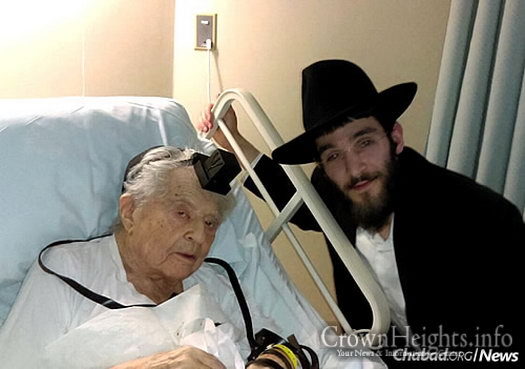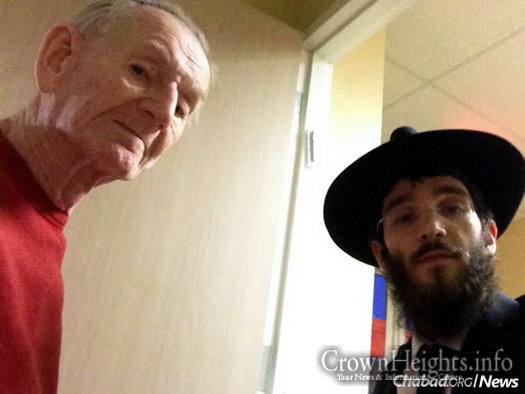
104-Year-Old’s Unexpected Final Mitzvah
from Chabad.org by Phreddy Wischusen:
Jacob Chartoff was born and raised in Boston. As a young man, he attended Harvard University enrolled in the Reserve Officers’ Training Corps, graduating with a degree in English literature. He chuckled when recalling that annual tuition back then was a whopping $500.
At 104, he had lots of stories to tell. And one of the people he told them to was Rabbi Levi Lezell.
For the past two years, Lezell and his wife, Mushky, have co-directed Chabad of the South Shore in Hingham, Mass., about a half-hour south of Boston. In addition to their standard programs—Torah study, classes, Jewish holiday events, services and Shabbat dinners—they try to bring a little cheer and tradition to Jews who are hospitalized, and to the local elderly.
Not long ago, Rabbi Hirschy Zarchi, director of Chabad Lubavitch of Cambridge, Mass., and the Chabad House at Harvard, contacted Lezell to let hom know that Galit Eizman, an Israeli professor who currently teaches economics at Harvard, met a Jewish centenarian at a nursing home in Plymouth, Mass. Would Lezell, who works not far from the facility, visit the gentleman?
In fact, Eizman offered to meet the rabbi there and accompany him.
On a blustery Boston day, in weather that almost prevented them from going, they met at the nursing home to see Chartoff. The two men bonded immediately, the rabbi tells Chabad.org.
“He was very jolly,” relates Lezell, “an indicator of how a person can reach such a distinguished age.” Chartoff had a rich life—he was at the top of his class, played the violin, worked as a political speechwriter—and while he celebrated Jewish holidays and learned Hebrew early on, as an adult he hadn’t been very connected to Judaism. Still, Lezell says, “he was obviously a very proud Jew.”
Like Chabad-Lubavitch rabbis everywhere, Lezell offered: Would his new friend care to wrap tefillin?
“He immediately agreed,” says the rabbi. “He said: ‘Do whatever you’ve got to do.’ It was very heartwarming.”
After they said the Shema together (with Eizman adding a hearty “Amen!”), Lezell started singing “David Melech Yisrael.” Without missing a beat, Chartoff joined in.
As the rabbi prepared to leave, he says the 104-year-old became a little emotional, even though his spirits seemed to be visibly uplifted. “It was as if I knew him for a lifetime,” says Lezell. “It was hard to leave.”
Big Power in Small Deeds
While he’d been told that Chartoff was the only Jew in the facility, Lezell decided to ask if anyone else might need a visitor. It turns out that there was, and he stopped to greet Robin Goldstein and say Tehillim (Psalms) for her.
Then a nurse directed him to 93-year-old Julian Rosenthal. Lezell noted that the older man looked downcast and uncommunicative. The rabbi mentioned that he just wanted to sit and schmooze—a word, Rosenthal said, that he “hadn’t heard in a long, long time.” He immediately perked up, said the rabbi, and rolled his wheelchair to his room and started talking.
“I was a weakling of a kid,” described the nonagenarian, who grew up in the Boston area. When he went to enlist in the Army during World War II, he was below the weight requirement, saying he “pleaded with them to take me in.” Rosenthal served as a telephone switchboard operator in France and Germany.
Although he may have lacked mass, Rosenthal had loads of conviction. A lifelong drummer, he was part of a 15-piece orchestra that played music mostly for enlisted men. One night, a group of officers demanded that the popular band play for them instead of their previously scheduled gig. “It came to a vote,” Rosenthal remembered. “We all decided that if we don’t play for the enlisted men, we don’t play for anybody.”
The group was disbanded, but Rosenthal still recalled the experience fondly: “I was damn proud to play in that band.”
After returning from the war, Rosenthal formed a new band with his brother, a trumpeter, and got himself a steady job with Stop & Shop, a chain of grocery stores in the Northeastern United States, where he worked for 45 years.
Sadly, his wife passed away at 32 from a kidney disorder, which also claimed the life of his son. (He also has a daughter.) Yet Rosenthal managed to stay strong. “I’ve had a good life,” he said.
His second wife passed away 10 years ago. After some health issues, the 93-year-old found himself in a nursing home, still adjusting to the environment when Lezell met him.
The two spent more than an hour getting to know each other. And then . . . the tefillin question.
Rosenthal was hesitant at first; he noted that he hadn’t performed the mitzvah in more than 60 years. But he decided to do so, and the rabbi reported that he seemed invigorated.
A few weeks after the visit, Rosenthal told the rabbi that he was getting more accustomed to his new home, and the two continue to keep in touch. Just recently, the rabbi hung a mezuzah on the doorpost of Rosenthal’s room. Lezell has also continued to be in touch with Goldstein.
Looking back on that original afternoon, four Jews became bound in the traditions of their faith. While the day’s events may have taken the elderly residents by surprise, it didn’t faze Lezell for a moment.
“Every positive action, no matter how seemingly small, has a lasting effect,” he says. “Opportunities come up to do a mitzvah; people take them, and it’s very powerful. Such deeds bring so much good to the world.”
Jacob Chartoff (Yakov ben Eliyahu) passed away three days after his visit from the rabbi. May his memory be a blessing.

















Beautiful story! Very inspiring!
Thanks so much for including it in this website!
Anonymous
How right to have this kind of story shared and learned from.
Such a beautiful report!
It is so refreshing to read this – how special for Mr. Chartoff to enter Olam Habah on the heels of this mitzvah. I will share this story with my guests at my Shabbos table. Yasher Koach!